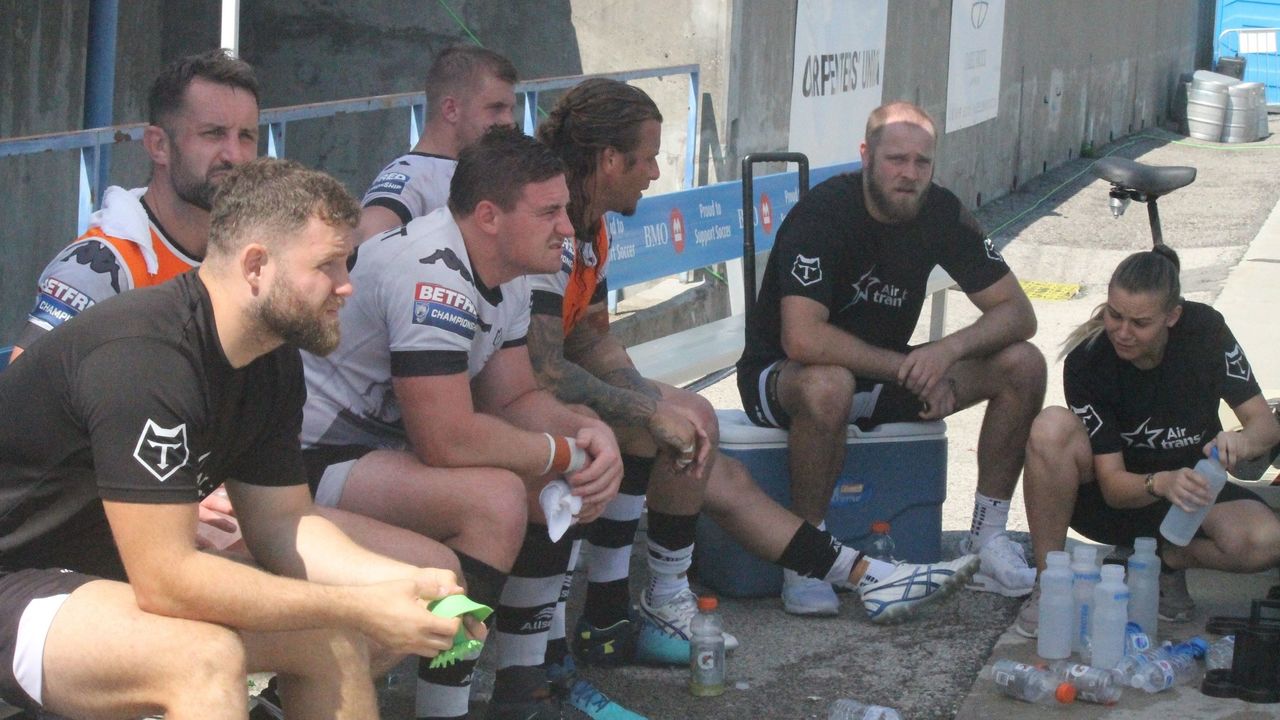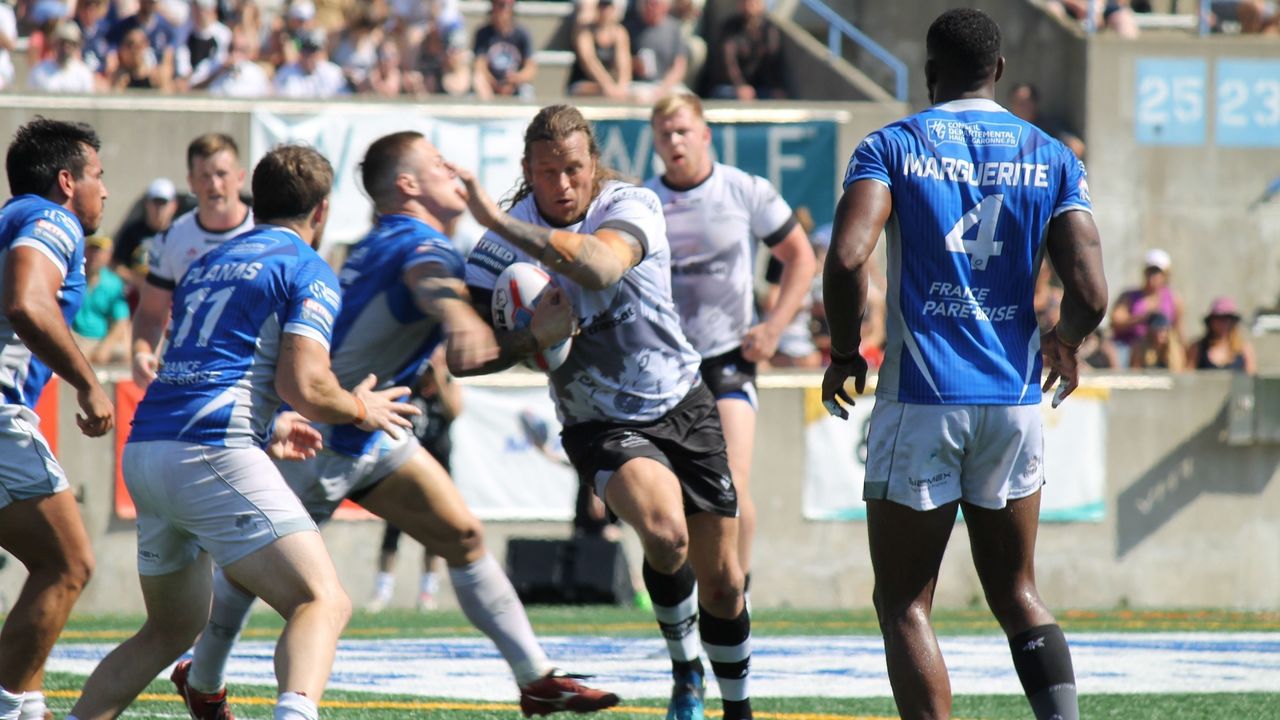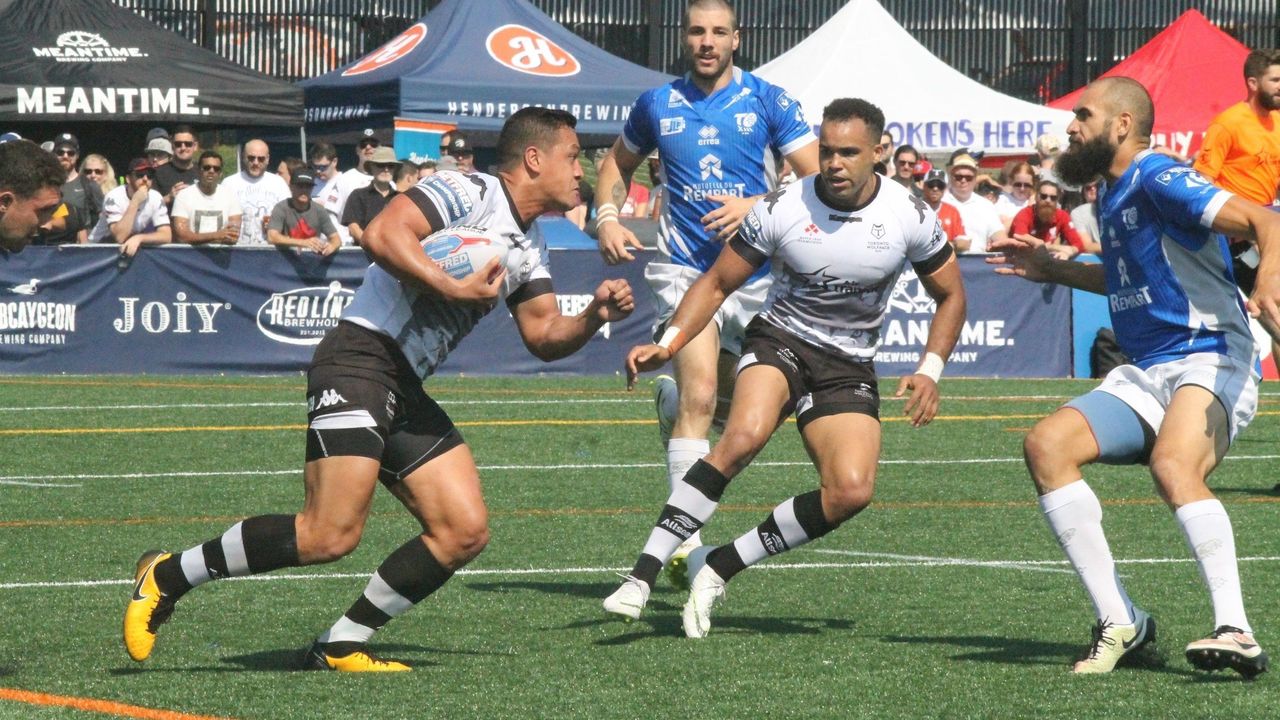Has a Toronto team found the formula to save rugby league in England?
TORONTO - In sporting terms, the M62 highway in northern England is commonly described as the rope in a 70-kilometer tug of war between soccer teams in Liverpool and Manchester. However, it's much more than that. Snaking exits lead to proud, working-class towns that traditionally subsist on industry in mines and mills. Here, soccer takes a backseat. This is rugby league country.
So it caused a stir when a new franchise in Toronto - 5,500 kilometers away - was dropped into the third tier of a rugby-league pyramid predominantly composed of teams from this region, where people may well put gravy on their chips but have never heard of cheese curds. Many of the players, raised in the humble towns along the M62, shocked their family and friends when they said they were moving to Canada to be part of the Toronto Wolfpack.
"It began with an F and ended with an F. That's what they said," veteran Bob Beswick, who doubles as the Wolfpack's strength and conditioning coach, told theScore.
"It was similar to my reaction when I first spoke to (head coach) Paul (Rowley) and a few of the lads that were joining. It was a bit crazy but, you know what, the world is a small place when you just open your eyes a little bit."
Rugby league threatened with extinction
When each M62 exit can mark a descent into enemy territory, why would a team from Canada be allowed to potentially dilute the rivalries that are so important to rugby league fans? And when even southern English and Welsh clubs are struggling to gain a foothold, why add a team from a country where most people haven't watched a full game of rugby?
Few people in Canada even know that rugby - similar to the way American football and Canadian football have slight but clear differences in their rulebooks - has two separate codes: union (historically preferred down south and with a strong contingent of privately schooled players) and league.

But things were becoming stale. The Rugby Football League (RFL) needed to do something radical to increase the game's reach, and that's how the Toronto Wolfpack became the world's first transatlantic sports team, beginning play in 2017.
"It's a game really that, in my opinion, is lacking in the Northern Hemisphere," admitted Yorkshireman and winger Liam Kay, the inaugural Wolfpack signing. "In Australia and down there it's like the No. 1 sport, but in my personal opinion, if it doesn't take off in Canada and change doesn't happen, I can see the game going part-time or even extinct in the Northern Hemisphere."
He added: "The heartlands, as people would say in England, are falling. (Teams) like your Bradfords and Batleys - they're not thriving anymore."
In recent years, numerous rule tweaks and structural shifts have changed the way each tier of the RFL operates - the Super League is the top level, followed by the Championship and then League 1 - but haven't greatly boosted national interest or turned the tides for moribund clubs. Bradford Bulls, once an established powerhouse, went out of business in 2016 following years of mismanagement. A new club was formed with the same name and spent 2018 in League 1. When England reached its first World Cup final in 22 years in 2017, the RFL didn't seize the opportunity to drive the sport's appeal. There are rumors that Super League clubs are considering leaving the governing body, unimpressed by its failure to attract children to rugby and an inability to curb or reverse declining attendance and shrinking TV audiences.
Plenty to learn from Toronto's matchday experience
The sport itself, however, is gripping. Canada Rugby League chairman Eric Perez recognizes that it shares the high pain threshold and pace that are treasured in ice hockey, and it's perhaps these aspects that have made fans flock to Lamport Stadium - or "The Den," as it's become known - on Saturdays since the team's first season. Brian Noble, the straight-talking director of rugby at the Wolfpack and former captain and coach of the England international setup, agrees with Perez's assessment.

"It's unbelievably good. That's why people in Canada come to watch it, because they love the game: blokes belt each other and get stuck into each other, and show a tremendous amount of skill. Nobody's ever defected away from that. We've got an unbelievable product," Noble said before firing a warning to the game's nerve center in northern England: "They've just got to sell it better."
And they can look to the Wolfpack for tips, because Toronto's doing more than selling rugby league. The Den's open-air beer garden pours local craft brews and flogs food at much lower prices than you'll find in the claustrophobic concourses of other Toronto sporting venues. The taps remain open while a DJ plays for a couple of hours postgame, often getting punters ready for a night out downtown. The branding has been a huge success, with demand for merchandise often emptying the modest Wolfpack shop.
The club also upholds a family atmosphere that's come to be reflected in the stands. Captain Josh McCrone's young children were roughing each other up with tackle pads in training last Friday. After the final whistle in Saturday's dramatic win over Toulouse Olympique (another non-English team ushered in to try and freshen up the RFL), they were some of the first non-players on the pitch.
Of course, it helps that the competitive results have been encouraging - the Wolfpack are battling to get into the Super League, which would be their second straight promotion after starting life as a League 1 team. But that's not what the top tier's chief executive, Robert Elstone, zeroed in on when he praised Toronto, lauding "an environment and atmosphere we should capture and promote across the whole of Super League." In the United Kingdom, the focus is strongly on the game. Toronto's turned its downtown fixtures into rich, varied events in an admittedly ugly venue.
Rowley and Noble believe the paying public in Britain have the right to and will complain - "if it's not raining in Yorkshire, it's overcast," Noble quipped - and many back in the sport's birthplace aren't keen on the Torontonian upstarts. But the naysayers still vocal after the Wolfpack's successes may simply feel threatened.

"I've seen people say that clubs in England should take a leaf out of Toronto's book in how they host a game. Not necessarily a party, but a whole experience rather than just a game," Kay said. "A lot of the negative people - the negatrons - are just the people that probably will never leave the city that they're from and are scared of change."
He concluded: "There's only a certain few rugby league brains that understand that it's only going to be good for the game."
Toronto's a multicultural hub that prides itself on inclusiveness. At Lamport Stadium, there are players, coaches, and management staff hailing from the Southern Hemisphere, the British Isles, and North America, all with a shared goal of promoting and preserving a sport they are infatuated with.
"English rugby league is very territorial and I understand that," Australian forward Ashton Sims said after Toronto's victory against Toulouse by a single, late point. "We're not trying to take over the English clubs, we want to be a part of it. We want to bring a different audience to the game that I grew up loving."
For English rugby league to remain competitive and draw fans, the narrow M62 corridor and other parochial pockets may need to follow Toronto's lead and open their doors.
Hang on - how can the Wolfpack get into the Super League?
In the current setup, the bottom four teams in the Super League and the top quartet in the Championship meet in a seven-game postseason tournament called the Super 8 Qualifiers that determines who gets top-tier and second-tier status next year.
The clubs that finish in the top three will play in the Super League in 2019, while the bottom trio will compete in the Championship. The fourth- and fifth-place teams, however, fight it out in a one-match playoff dubbed the Million Pound Game. The victor goes to the Super League, and the loser to the Championship. If the Super 8 Qualifiers finished today, Toronto would welcome Toulouse back to Lamport Stadium for a winner-take-all finale.
| Team | Played | Won | Drawn | Lost | Pts Diff | Points |
|---|---|---|---|---|---|---|
| Salford Red Devils | 5 | 4 | 0 | 1 | 112 | 8 |
| Leeds Rhinos | 5 | 4 | 0 | 1 | 52 | 8 |
| Hull KR | 5 | 4 | 0 | 1 | 16 | 8 |
| Toronto Wolfpack | 5 | 3 | 0 | 2 | 9 | 6 |
| Toulouse Olympique | 5 | 2 | 0 | 3 | -11 | 4 |
| London Broncos | 5 | 2 | 0 | 3 | -13 | 4 |
| Widnes Vikings | 5 | 1 | 0 | 4 | -43 | 2 |
| Halifax | 5 | 0 | 0 | 5 | -122 | 0 |
Each team has two matches left, and the Wolfpack face a difficult slate. On Saturday, Widnes Vikings invade Liberty Village with their Super League status hanging by a thread. The following Friday, the Wolfpack are in Leeds to take on the Rhinos, who won the Super League last season.
Sadly, the 2018 campaign marks the end of one of the most exciting postseasons in sports. Super League clubs, perhaps in another bid to ward off teams trying to gatecrash the elite, recently voted in favor of a one-up, one-down relegation and promotion system that comes into effect next year.